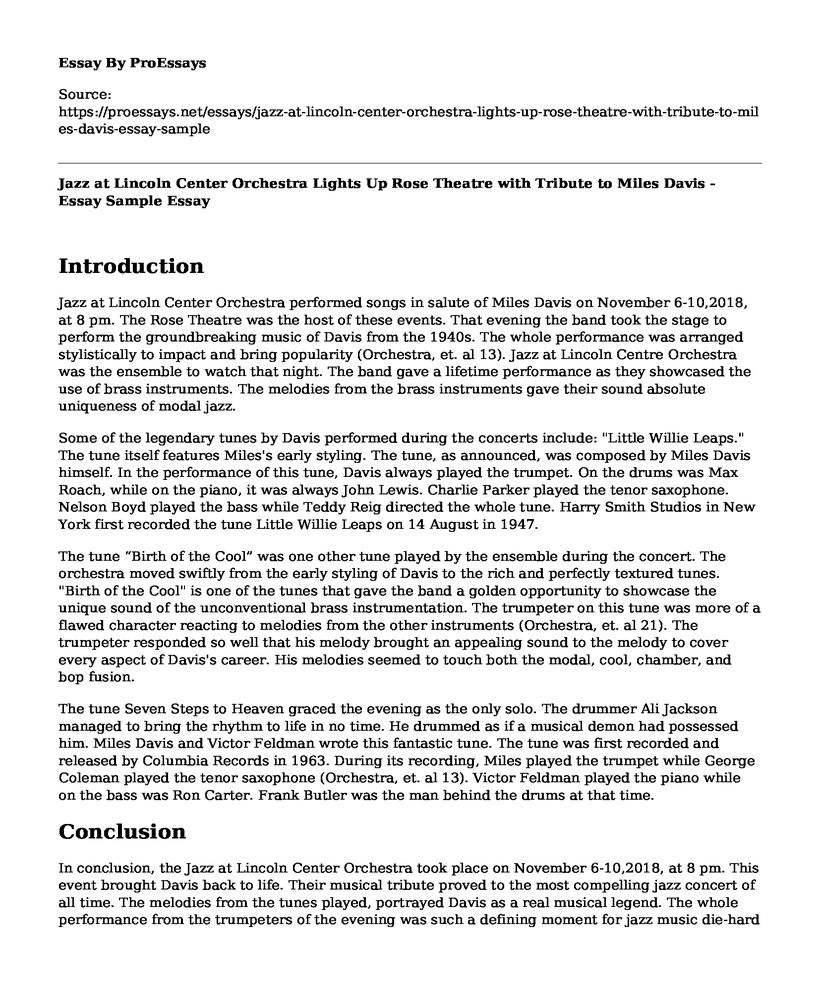Introduction
Jazz at Lincoln Center Orchestra performed songs in salute of Miles Davis on November 6-10,2018, at 8 pm. The Rose Theatre was the host of these events. That evening the band took the stage to perform the groundbreaking music of Davis from the 1940s. The whole performance was arranged stylistically to impact and bring popularity (Orchestra, et. al 13). Jazz at Lincoln Centre Orchestra was the ensemble to watch that night. The band gave a lifetime performance as they showcased the use of brass instruments. The melodies from the brass instruments gave their sound absolute uniqueness of modal jazz.
Some of the legendary tunes by Davis performed during the concerts include: "Little Willie Leaps." The tune itself features Miles's early styling. The tune, as announced, was composed by Miles Davis himself. In the performance of this tune, Davis always played the trumpet. On the drums was Max Roach, while on the piano, it was always John Lewis. Charlie Parker played the tenor saxophone. Nelson Boyd played the bass while Teddy Reig directed the whole tune. Harry Smith Studios in New York first recorded the tune Little Willie Leaps on 14 August in 1947.
The tune “Birth of the Cool” was one other tune played by the ensemble during the concert. The orchestra moved swiftly from the early styling of Davis to the rich and perfectly textured tunes. "Birth of the Cool" is one of the tunes that gave the band a golden opportunity to showcase the unique sound of the unconventional brass instrumentation. The trumpeter on this tune was more of a flawed character reacting to melodies from the other instruments (Orchestra, et. al 21). The trumpeter responded so well that his melody brought an appealing sound to the melody to cover every aspect of Davis's career. His melodies seemed to touch both the modal, cool, chamber, and bop fusion.
The tune Seven Steps to Heaven graced the evening as the only solo. The drummer Ali Jackson managed to bring the rhythm to life in no time. He drummed as if a musical demon had possessed him. Miles Davis and Victor Feldman wrote this fantastic tune. The tune was first recorded and released by Columbia Records in 1963. During its recording, Miles played the trumpet while George Coleman played the tenor saxophone (Orchestra, et. al 13). Victor Feldman played the piano while on the bass was Ron Carter. Frank Butler was the man behind the drums at that time.
Conclusion
In conclusion, the Jazz at Lincoln Center Orchestra took place on November 6-10,2018, at 8 pm. This event brought Davis back to life. Their musical tribute proved to the most compelling jazz concert of all time. The melodies from the tunes played, portrayed Davis as a real musical legend. The whole performance from the trumpeters of the evening was such a defining moment for jazz music die-hard fans. It was indeed a happy and relaxing moment for most, if not all, jazz music lovers. It was also the beginning of a loving jazz journey for amateur jazz fans. The restriction of improvisation in live performance was such a great lesson. It ensures a specific flow in the tones and maintains the original rhythm of the tune.
Work Cited
Orchestra, Jazz Heritage, Dennis Reynolds, and Michael R. Williams. "Jazz at Lincoln Center:" Essentially Ellington" Regional High School Jazz and Band Festival (2013)." (2013).
Cite this page
Jazz at Lincoln Center Orchestra Lights Up Rose Theatre with Tribute to Miles Davis - Essay Sample. (2023, Aug 28). Retrieved from https://proessays.net/essays/jazz-at-lincoln-center-orchestra-lights-up-rose-theatre-with-tribute-to-miles-davis-essay-sample
If you are the original author of this essay and no longer wish to have it published on the ProEssays website, please click below to request its removal:
- Net Neutrality - Essay Example
- Graffiti Writing: This Is Modern Art Play Essay
- How China Fashion Companies Use a Foreign Brand to Achieve Success
- Essay Example on Opera, Operetta, and Musicals: 3 Theatrical Forms
- Essay Example on The Beatles: The Greatest Rock and Roll Band of All Time
- Movie Analysis Essay on The New Americans
- Essay Example on Shakespeare and Middleton's Timon of Athens: A Tale of Moral Conviction







